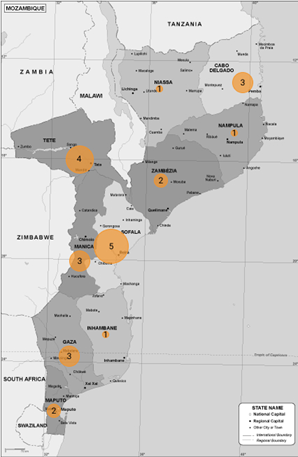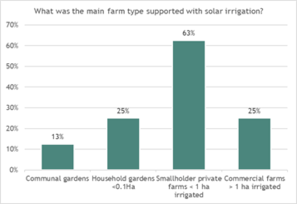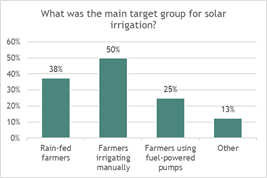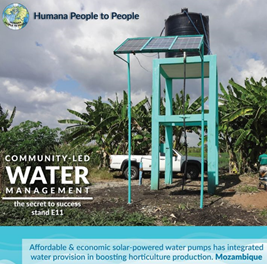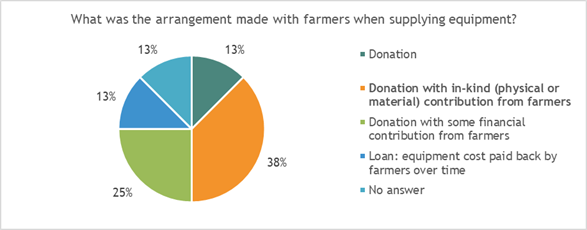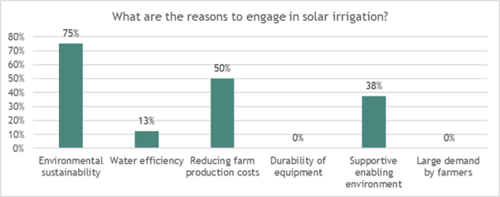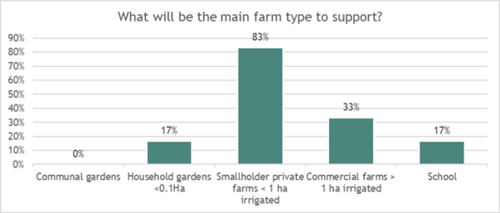Solar Powered Irrigation in Mozambique : SPIS Support Initiatives
Introduction
This article is part of the publication on Solar irrigation market analysis in Mozambique which looks at the feasibility of introducing individual solar-powered irrigation packages at small scale enterprise level in Mozambique.
Overview of SPIS Support Initiatives
Supporting organisations like governments and NGOs have played a major role in upscaling solar-powered irrigation systems worldwide. This is not any different in Mozambique. In fact, the number of solar irrigation pumps distributed by the Mozambican government (4100 pumps) outweighs the sales of all private sector respondents combined (2751 pumps). This is possible since the pumps have been imported directly from the manufacturer, without involvement of the solar pump suppliers within Mozambique. Most NGOs involved in solar irrigation projects did purchase their solar pumps from local suppliers.
The map shows the number of solar irrigation projects hosted in each province. The reason that most solar pumps have been distributed in Central Mozambique seems to be the availability of recovery funds for the region that was hit by the Idai cyclone in 2019.
Unless mentioned differently, the data shown in this chapter result from the online survey sent to NGOs and government officials. Both government officials, as well as 7 out of 9 NGO respondents had effectively taken part in a solar irrigation project over the past years. The following organizations have played a role in solar pump support initiatives (in random order). The respondents indicated that their roles included project management, coordination, implementation, promotion and technical assistance
Table 10 Organizations with solar pump support initiatives
| Organizations involved in solar pump projects in Mozambique (in random order and combination) | |
| Government institutes | Donors / NGOs |
| Instituto Nacional de Irrigação (INIR)
Ministerio da Agricultura |
Oxfam, ADPP
Foundation for Community Development (FDC) |
| FUNAE, MIREME, FNDS, MINAG, MOPH | GEF |
| Provincial Directorate of Agriculture and Fisheries-DPAP | World Bank |
| Agencia do Vale de Zambeze (2x) | Netherlands Embassy (2x) |
| UniLúrio, IQQEM | Spanish development embassy |
| District Services for Economic Activities (SDAE) (2x) | JICA, |
| Agrarian Development Fund-FDA, | IFAD |
| Provincial directorate of agriculture and IIAM
DNA, AIAS, ADEMC, CMCM |
Sida
Adel Sofala |
| FDC (FASER window) | GIZ (EnDev and GBE) |
| Direcção Provincial de Agricultura e Segurança Alimentar (DPASA) | UNIDO
FAO, Care, World Vision |
Target and Distribution
As mentioned above, the largest solar irrigation initiative in Mozambique is implemented by the government institute INIR in 10 provinces. For its first SPIS initiative, funded by the World Bank, INIR distributed 4200 solar pumps and drip kits of 500 m2 amongst farmers in 10 provinces between 2018 and 2019. The technology was made available through the provincial (DPASA) and local government institutes. The target were arid and semi-arid districts. At the moment INIR is purchasing another 2400 kits of the same equipment for Idai affected farmers in Inhambane, Sofala, Tete and Manica provinces. INIR mentions that the willingness of the private sector (equipment suppliers) to invest is one of the main challenges related to solar irrigation in Mozambique.
The World Bank, through its Mozambique Energy for All (ProEnergia) project (2019-2023) has committed further investments in off-grid energy including solar water pumps for agriculture, through the project’s sub-component B2: Off-grid results-based financing (RBF) Facility managed by FUNAE. This sub-component will target selected provinces in the northern region, where the poverty incidence is high[1]. The FASER window implemented by GIZ Endev and GBE and the FDC provides financial incentives to the private sector with the aim to accelerate the sustainable growth of renewable energies including solar irrigation pumps[2].
The specific farm segment targeted by the different supporting organizations are mainly smallholder private farms with less than 1 ha irrigated. Since the large INIR projects target both household gardens (<0.1ha) and smallholder private farms (<1ha), this group will receive the largest number of solar pumps by far.
As for the target groups, most organizations tend to focus on farmers that are currently irrigating by hand (50%). Yet in absolute numbers, most pumps will be distributed amongst individual rain-fed farmers, as this is the target group indicated by INIR. The project by UNIDO and ADPP has almost as many beneficiaries (4000) yet this is because their target consist of communal farmers with on average 50 farmers per solar pump[3]. See the picture of the ADPP communal solar irrigation system[4].
Approach to Sustainability
Most respondents (57%) indicated that training farmers on operation and maintenance is their main approach towards sustainability. Another 29% mentioned that shared ownership and income generated from common fields can be used to assure maintenance and sustainability.
The following overview compares the costs of some solar irrigation systems installed through government or NGO projects. All costs include solar panels, irrigation technology and installation. When assuming 2000 m2 per farmer, following the characteristics of small solar pumps as shown in chapter 2, the price of a package for one individual farmer would range from 1350 to 3580 Euro. Two respondents have done a cost benefit analysis, showing a return of investment in 2 and 3 years respectively.
Table 11 Cost of solar irrigation projects in Mozambique
| Project | Number of beneficiaries | What is the total number of solar pumps distributed in the project? | What was the total cost of the solar pumps and irrigation systems? | What was the estimated total area (ha) covered by solar irrigation in the project? | Estimated Cost EUR/ha[1] |
| A4Labs | 3 | 5 | 3375 (EUR) | 0.5 ha | 6,750 |
| Susainable Energy for All | 4000 | 80 | 406000 (MZN) | 47 ha | 9,466 |
| INIR | 4200 | 4100 | USD 4 million | 210 ha | 15,613 |
| APSAN-Vale | 15 | 15 | OVER 2000 USD | > 3ha | 8,197 |
| PROSUL | 2 associations | 5,229,921 MZN | 4 ha | 17,910 |
In terms of the arrangement with farmers, the survey results indicated that just over 50% of the projects has donated the pumps without a financial contribution from the farmers. The INIR project includes “some financial contribution from farmers”.
Strategies for Future Initiatives
Overall, 67% of the organizations considers the introduction of solar irrigation as a success. The remaining projects were either still running or called a failure due to the theft of solar panels (in 2 projects). Yet, 7 out of 8 organizations mention that they plan to continue promoting solar irrigation activities in the near future. The remaining one does not, due to a change of thematic focus. As shown below, the main reason for organizations to engage in solar irrigation is the environmental sustainability (75%), followed by reducing farm production costs (50%). Desk research also found reduction of CO2 emissions and reducing farm costs as the major rational by NGOs to promote SPIS in Mozambique[5].
The main farm type to support in future projects will be smallholder private farms.
Furthermore, most organizations (67%) will demand a financial contribution from farmers in future projects. A donation without financial or in-kind contribution is no longer an option for any of the respondents.
Further Information
- Mozambique Off-grid Knowledge Hub
- Solar Powered Irrigation in Mozambique : Market Landscape
- Solar Powered Irrigation in Mozambique : Market Share
- Solar Powered Irrigation in Mozambique : Barriers
- Solar Powered Irrigation in Mozambique : Recommendation
- https://www.tse4allm.org.mz/index.php/en/midia/pequenos-agricultores-em-mocambique-adotam-a-energia-solar
- https://www.ace-taf.org/wp-content/uploads/2021/04/Stand-Alone-Solar-SAS-Market-Update-Mozambique.pdf
Reference
This article is part of the publication written by *****, Practica Foundation.
- ↑ https://documents1.worldbank.org/curated/fr/594061554084119829/pdf/Mozambique-Energy-for-All-ProEnergia-Project.pdf
- ↑ https://www.faser.co.mz/landing/Structure
- ↑ https://www.unido.org/stories/smallholder-farmers-mozambique-embrace-solar-energy
- ↑ https://m.facebook.com/adppmoz/posts/1631304883668239/
- ↑ https://reliefweb.int/sites/reliefweb.int/files/resources/CSA_Profile_Mozambique.pdf
[1] A EUR/USD rate of 1/1.22 was used in this report, following the official exchange rate on www1.oanda.com at 28/05/21. The values are estimated since some currencies and units had to be interpreted by the author, through cross-checking with the replies on other questions.

